
125th out of 146 countries!?
Japan is a leader in gender equality
The shock of being an extremely underdeveloped country
Japan is a leader in gender equality
The shock of being an extremely underdeveloped country
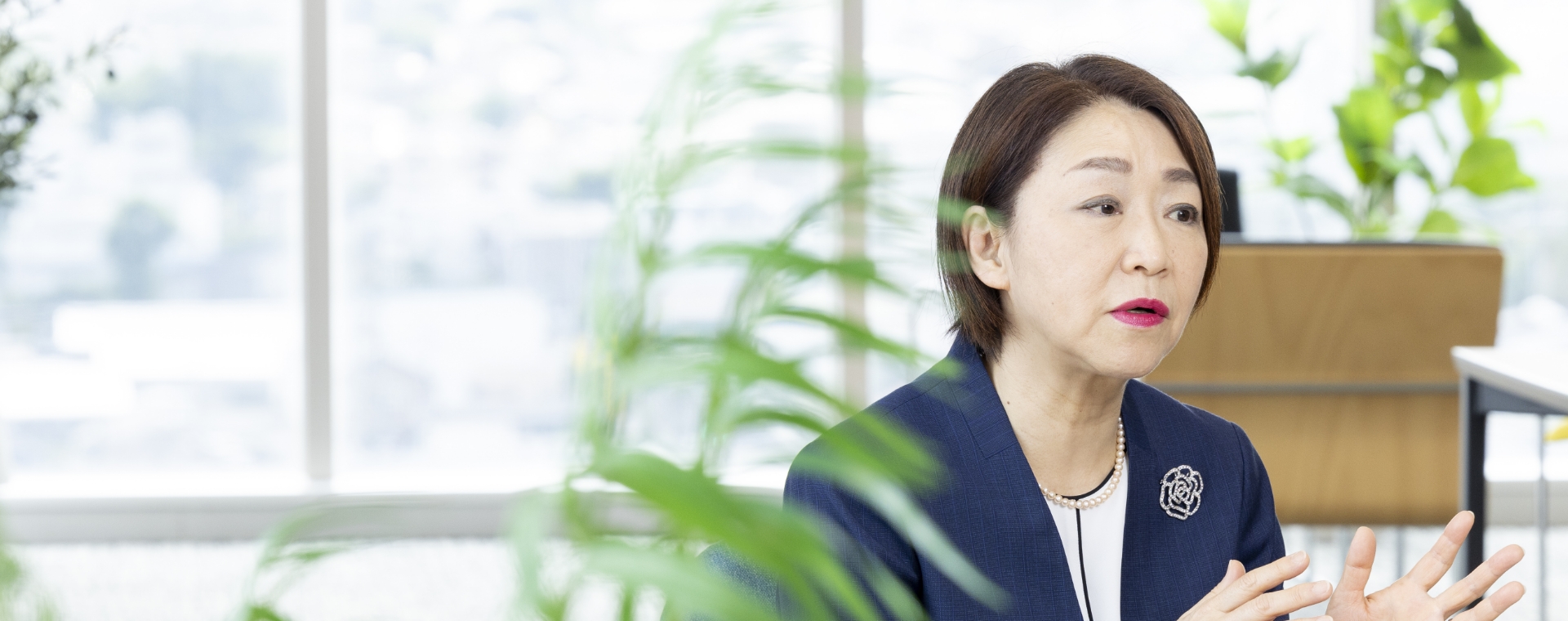
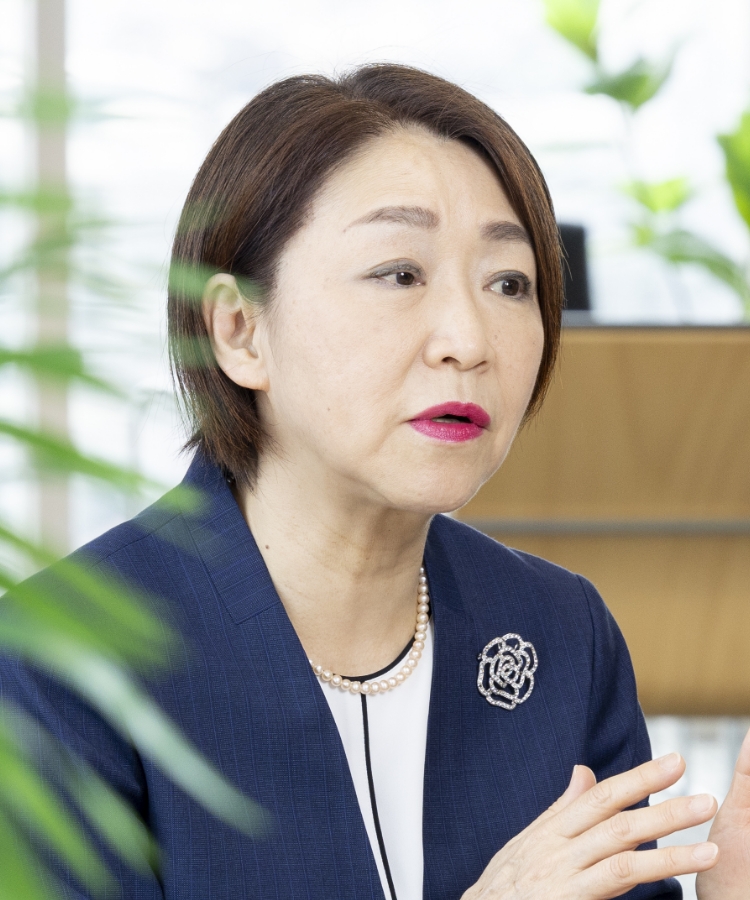
#Asia University research
AKIZUKI Hiroko Professor
Faculty of International Relations Department of International Relations
2023.11.01
In the series "If it's not interesting, it's not academia!", we introduce research content and anecdotes of Asia University faculty members. The third feature is Professor AKIZUKI Hiroko Faculty of International Relations, Department of International Relations.
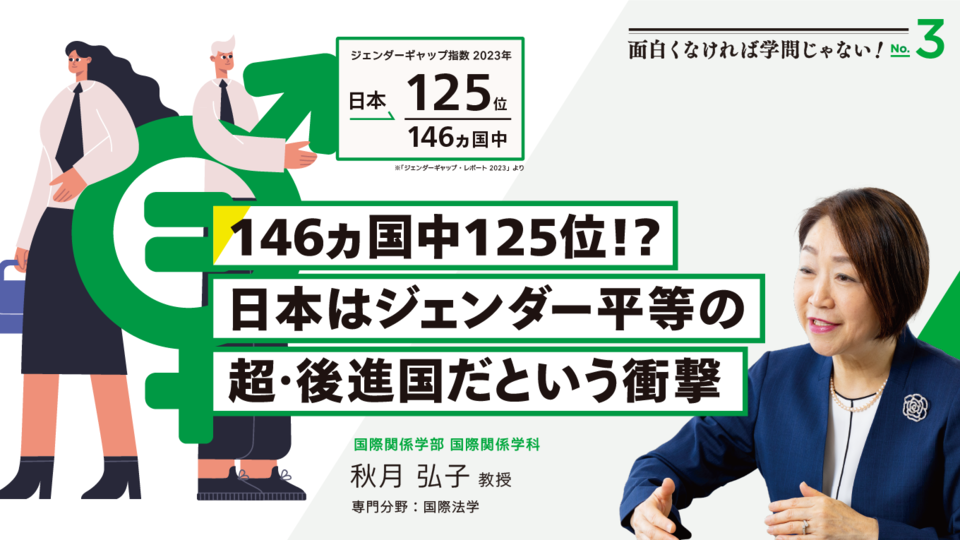
In the political and economic fields
The big gender gap
The big gender gap
In 2023, Japan was ranked 125th out of 146 countries. This is the lowest rating ever, down 9 ranks from the previous year. It was originally ranked low, but this was shocking. In particular, it ranks 138th in the political field and 123rd in the economic field. Ranked 47th in education. However, the score and ranking dropped due to the inclusion of the male-female ratio of higher education enrollment rates, for which there was no data last time. Ranked 59th in the health category. In the medical field itself, there are still barriers for women to reach senior positions. The World Economic Forum also collects detailed data and evaluates this situation.
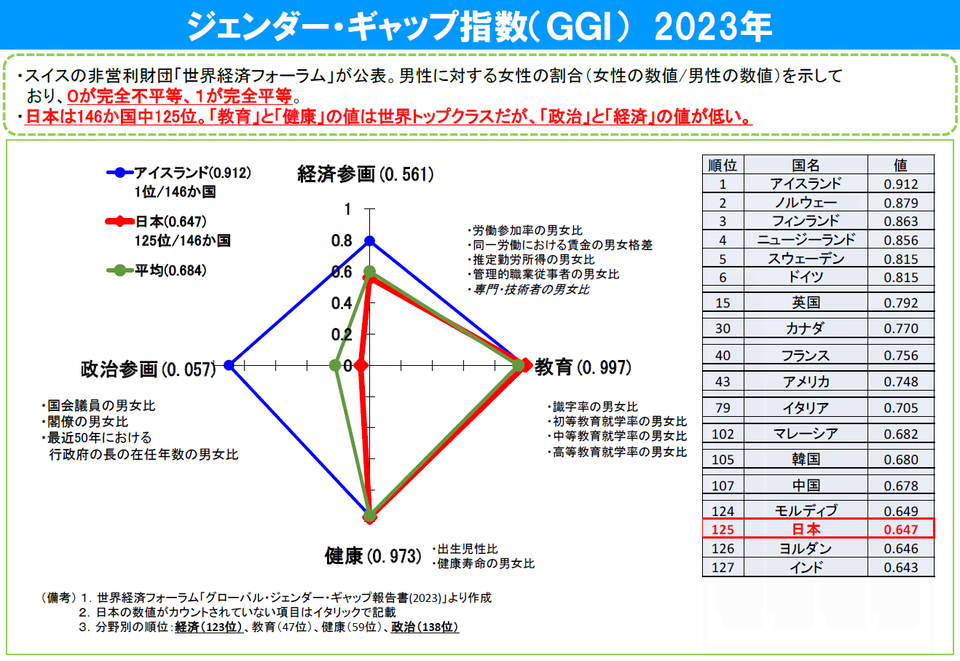 Source: Cabinet Office Gender Equality Bureau (https://www.gender.go.jp/international/int_syogaikoku/int_shihyo/index.html)
Source: Cabinet Office Gender Equality Bureau (https://www.gender.go.jp/international/int_syogaikoku/int_shihyo/index.html)First, we have created strong laws and policies aimed at closing the gender gap. We have fostered a culture of gender equality through school education and other means. We have actively participated in international initiatives and made efforts to eliminate problems. And the last point is the most important point. The idea is to raise men's awareness and encourage their participation.
In Japan, when it comes to women's rights, men tend to think of it as someone else's problem. However, since this is an issue affecting society as a whole, it is only natural that men should be involved.
Many countries, including Iceland, are taking concrete steps to close the gender gap and improve their index rankings. The reason Japan's ranking is falling is because, despite the efforts of other countries, it is doing "almost nothing." If the situation surrounding the gender gap does not change, there is no doubt that the ranking will continue to decline.
In other countries, laws and systems
Efforts to bridge the gap
Efforts to bridge the gap
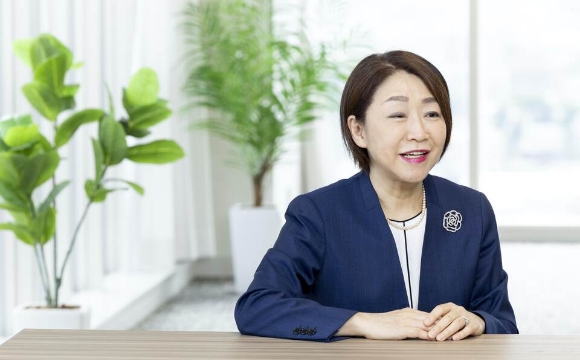
First of all, what is the "gender gap"? How is it different from "discrimination against women"?
Gender does not refer to biological classification of men and women, but rather to the perception of sexual differences that has been created through history, culture, and social customs. "Women are sensitive and kind," "The person who takes charge has to be a man," "Thoughtful people have high femininity," "Men have to support their partners and families"... These are concepts that have been imprinted on our minds at some point. You could also say that they are what society expects us to be. However, there are many people, both men and women, who suffer under this curse. The bias of the imaginary gender image that we unconsciously accept makes it difficult for people to live.
There are many professions that have been considered unsuitable for women. However, today, many women are active in the fields of firefighting, self-defense force, civil engineering, construction, fishing, and more. However, as mentioned above, Japan is judged extremely low in the fields of politics and economics. If you look at the data, you will understand why.
The proportion of women in senior management positions in national civil servants is 44.6% in Canada, and in the 30-40% range in the UK, the US, Italy, Germany and France. In South Korea, it is 8.6%, while in Japan it is 4.2%. In mid-level management positions, Germany and Canada are over 50%, South Korea is 25.7%, while in Japan it is only 4.9% (2021 survey).
Gender does not refer to biological classification of men and women, but rather to the perception of sexual differences that has been created through history, culture, and social customs. "Women are sensitive and kind," "The person who takes charge has to be a man," "Thoughtful people have high femininity," "Men have to support their partners and families"... These are concepts that have been imprinted on our minds at some point. You could also say that they are what society expects us to be. However, there are many people, both men and women, who suffer under this curse. The bias of the imaginary gender image that we unconsciously accept makes it difficult for people to live.
There are many professions that have been considered unsuitable for women. However, today, many women are active in the fields of firefighting, self-defense force, civil engineering, construction, fishing, and more. However, as mentioned above, Japan is judged extremely low in the fields of politics and economics. If you look at the data, you will understand why.
The proportion of women in senior management positions in national civil servants is 44.6% in Canada, and in the 30-40% range in the UK, the US, Italy, Germany and France. In South Korea, it is 8.6%, while in Japan it is 4.2%. In mid-level management positions, Germany and Canada are over 50%, South Korea is 25.7%, while in Japan it is only 4.9% (2021 survey).
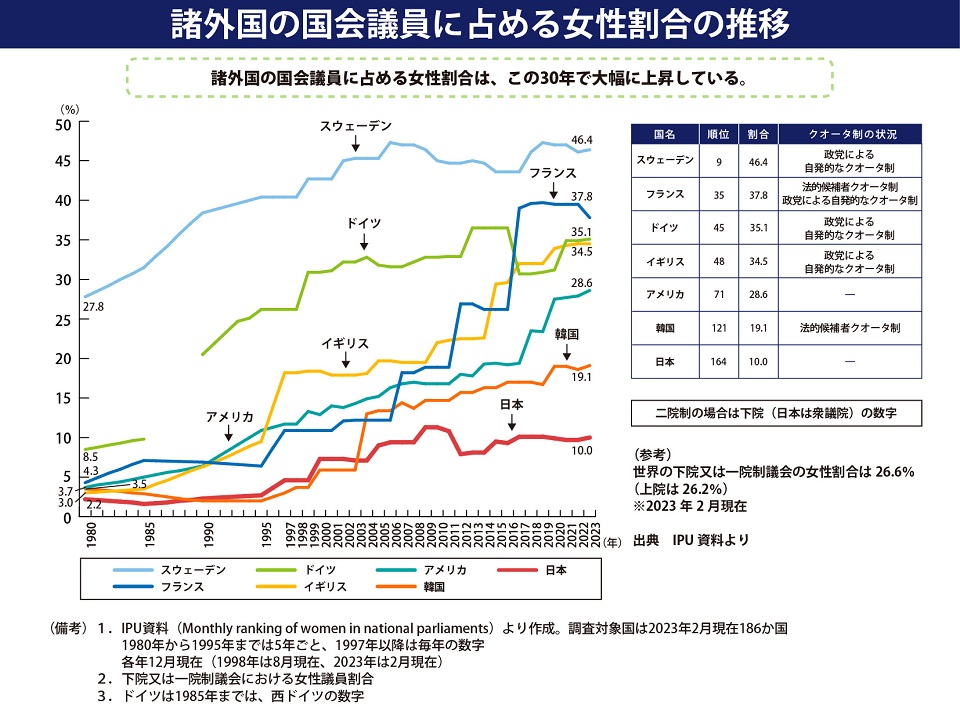
Japan has set a goal of increasing the number of women in parliament to 30% over the next 10 years, but this is only a goal, not a requirement. However, many countries have enacted laws to increase the number of women in parliament.
For example, France enacted the "Parite Law" in 2000. Parity means equality and equality, and it requires each party to have an equal number of male and female candidates in almost all national and local elections. There are penalties for violation. The 2013 reform created a system for male and female candidates to run in pairs in local assembly elections, where the number of female members had been slow to increase. Voters also vote for pairs. It is recommended that pairs be from different political parties or factions. These policies have led to a dramatic increase in the number of women in France's parliament.
In the UK, there is a system called designated constituencies for women. The idea is to limit the number of candidates to women in constituencies where there is a high probability that the next candidate will be elected due to reasons such as an incumbent member announcing his or her retirement. Also, since men tend to be the leaders of neighborhood associations, it is mandatory for a woman to be present. This is because, just as with national issues, women's perspectives are essential when considering issues in the regions where we live.
The promotion of women
Increase company value
Increase company value
In fact, for companies, having women playing an active role in their companies has great management benefits. Half of consumers are women, so products developed from a female perspective will likely lead to increased profits. Investors also consider the proportion of female Officer and diversity initiatives to be important guidelines. Companies that proactively address these social issues are more likely to attract investment. Nowadays, all the major companies that have understood this are taking various initiatives. In the future, it will be necessary to expand this to medium-sized companies as well.
There are many countries in the world that have laws and systems for gender equality. The Gender Equality Committee has been established within the Diet to review laws. This is because all countries have historically had gender-based attitudes such as ``women cannot be in politics or management'' and ``women should not lead men.'' If we leave it to nature, people's consciousness will not change. We have worked to eliminate the gender gap by creating solid systems. Even in Islamic countries such as Morocco, Egypt, and Indonesia, where the status of women is perceived to be low, there is a rule that women make up at least 30% of parliamentarians. Japan is now completely behind the times.
What is the United Nations Committee on the Elimination of Discrimination against Women?
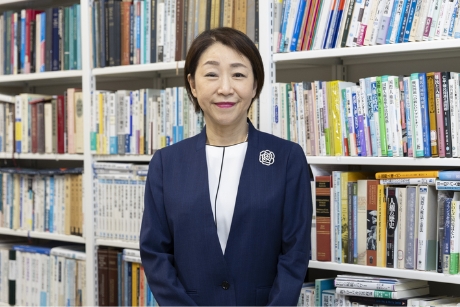
Some may say that a system that favors women is not a reverse gender inequality for men. However, the first goal should be to eliminate the inequality that has existed for hundreds of years. Temporary laws and systems are needed to change the old society that excluded women or placed them in a lower position. This will also change the attitude of men. And once equality is achieved, it is time to make the system neutral, not just preferential, for women. In fact, Sweden stopped its preferential treatment policy once it had started to produce results. Iceland has also reverted from a female-favorable system to a gender-neutral law starting this year.
The United Nations has established the Committee on the Elimination of Discrimination against Women. There are 23 members elected from each country, and I am one of them. Based on the Convention on the Elimination of All Forms of Discrimination against Women, which came into force in 1981, the committee reviews the situation in the 189 member countries and issues recommendations. I go to Geneva three times a year and listen to the delegations of the various countries I am in charge of.
Recommendations influence the policies of each country. After the 2016 review, Japan raised the marriage age for women from 16 to 18, and amended the law to extend the period during which people could remarry after divorce from six months to 100 days. Although the option to allow married couples to have different surnames has been recommended, this has yet to be realized. Recommendations have also been made to eliminate indirect discrimination based on unconscious "femininity" and "masculinity," but no concrete efforts have been made. How will the next review evaluate this? It may be tough.
I want students studying at Asia University and other young people to face the global movement to eliminate the gender gap and the reality in Japan, and think about what they need to do to change this society. The choice you make will have a direct impact on your own future, regardless of gender.
The United Nations has established the Committee on the Elimination of Discrimination against Women. There are 23 members elected from each country, and I am one of them. Based on the Convention on the Elimination of All Forms of Discrimination against Women, which came into force in 1981, the committee reviews the situation in the 189 member countries and issues recommendations. I go to Geneva three times a year and listen to the delegations of the various countries I am in charge of.
Recommendations influence the policies of each country. After the 2016 review, Japan raised the marriage age for women from 16 to 18, and amended the law to extend the period during which people could remarry after divorce from six months to 100 days. Although the option to allow married couples to have different surnames has been recommended, this has yet to be realized. Recommendations have also been made to eliminate indirect discrimination based on unconscious "femininity" and "masculinity," but no concrete efforts have been made. How will the next review evaluate this? It may be tough.
I want students studying at Asia University and other young people to face the global movement to eliminate the gender gap and the reality in Japan, and think about what they need to do to change this society. The choice you make will have a direct impact on your own future, regardless of gender.
Related Links
- Faculty of International Relations TOP
- Introduction to Faculty of International Relations Department of International Relations
- 4 years of study Faculty of International Relations Department of International Relations
- Introduction to classes in Faculty of International Relations Department of International Relations
- Faculty of International Relations Department of International Relations Seminar
- Faculty of International Relations Department of International Relations Expert English Program
- Faculty introduction Faculty of International Relations Department of International Relations
- Election results for Committee on the Elimination of Discrimination against Women|Ministry of Foreign Affairs
- Membership Committee on the Elimination of Discrimination against Women|United Nations
- United Nations Information Center Blog: Relay Essay “Human Rights and Me” (1) AKIZUKI Hiroko: An unlucky woman in a lucky country?